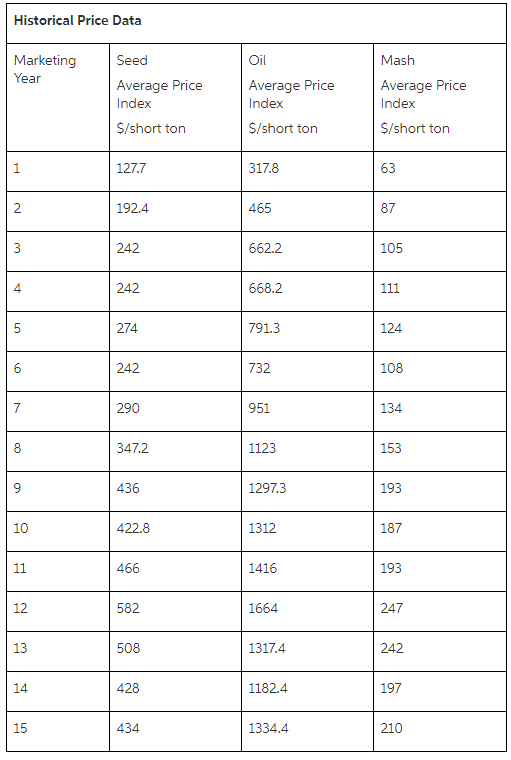Question
TourneSol Canada, Ltd. is a producer of high quality sunflower oil. The company buys raw sunflower seeds directly from large agricultural companies, and refines the
TourneSol Canada, Ltd. is a producer of high quality sunflower oil. The company buys raw sunflower seeds directly from large agricultural companies, and refines the seeds into sunflower oil that it sells into the wholesale market. As a by-product the company also produces sunflower mash (a paste made from the remains of crushed sunflower seeds) that it sells into the market as base product for animal feed.
The company has a maximum input capacity of 150 short tons of raw sunflower seeds every day (or 54,750 short tons per year). Of course the company cannot run at full capacity every day as it is required to shut down or reduce capacity for maintenance periods every year, and it experiences the occasional mechanical problem. The facility is expected to run at 90% capacity over the year (or, on average 150 x 90% = 135 short tons per day).
TourneSol is planning to purchase its supply of raw sunflower seeds from three primary growers, Supplier A, Supplier B and Supplier C. Purchase prices will not set until the orders are actually placed so TourneSol will have to forecast purchase prices for the raw material and sales prices for the refined sunflower oil and mash. The contract is written such that TourneSol is only required to commit to 70% of total capacity up front. Any amounts over that can be purchase only as required for the same price. Historical prices for the last 15 year are in the table below (note that year 15 is the most current year)

Sunflower oil contains a number of fatty acids, some which are desirable in food products and others that are not. One desirable fatty acid is oleic acid. TourneSol produces high oleic oil for the wholesale market, and requires that the oleic acid content be a minimum of 77%. Sunflower oil also contains trace amounts of iodine. The market requires that that iodine content be a minimum of 0.78% and maximum of 0.88%
The oleic acid and iodine content for the sunflower seeds form the three suppliers is given in the table below.
Supplier |
Oleic Acid |
Iodine |
A |
72% |
0.95% |
B |
82% |
0.85% |
C |
65% |
0.72% |
For all three suppliers, it is expected that the average yield of oil from the seeds is 30%. There is no net loss of material, so the yield of mash from the same supply is expected to be 70%.
Because the oleic acid and iodine content varies across the three suppliers, so does the price. It is expected that the cost of supply from the suppliers will be a percentage of the market average price of seeds.
Supplier |
Cost as % of Average Market Price of Seed |
A |
85% |
B |
100% |
C |
90% |
The company faces an additional variable production cost of $10/short ton and an estimated fixed cost of $1,750,000 over the upcoming production period.
Required:
The company is asking you to provide a recommendation on the amount of raw material it should purchase from each supplier to minimize its cost of feedstock. Management is also looking for an analysis on the profitability of the company in the next production cycle.
Historical Price Data Marketing Year 1 2 3 4 5 6 7 8 9 10 11 12 13 14 15 Seed Average Price Index $/short ton 127.7 192.4 242 242 274 242 290 347.2 436 422.8 466 582 508 428 434 Oil Average Price Index $/short ton 317.8 465 662.2 668.2 791.3 732 951 1123 1297.3 1312 1416 1664 1317.4 1182.4 1334.4 Mash Average Price Index $/short ton 63 87 105 111 124 108 134 153 193 187 193 247 242 197 210
Step by Step Solution
3.40 Rating (163 Votes )
There are 3 Steps involved in it
Step: 1

Get Instant Access to Expert-Tailored Solutions
See step-by-step solutions with expert insights and AI powered tools for academic success
Step: 2

Step: 3

Ace Your Homework with AI
Get the answers you need in no time with our AI-driven, step-by-step assistance
Get Started


